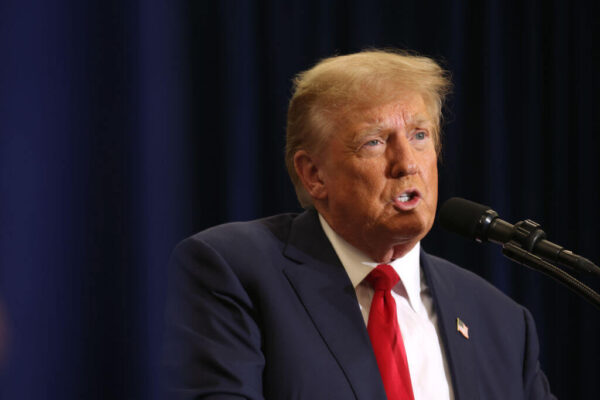‘I Am Going Through It Right Now’: Donald Trump Decries Appeals Court’s Presidential Immunity Ruling, Claims It’s ‘Dangerous’ to the Country
Donald Trump shared his objection to an appeals court decision ruling that he does not have presidential immunity and can stand trial in the federal election interference case.
On Tuesday, the U.S. Circuit Court of Appeals ruled that former presidents do not have blanket immunity to shield them from being prosecuted for any alleged crimes they committed during their time in the White House. This effectively rejects Trump’s claim that his status as a former president safeguards him from federal charges alleging that he plotted to overturn the 2020 presidential election.
It took a month for the D.C. Circuit Court to issue its ruling after a district judge presiding over the federal election subversion case rejected Trump’s immunity argument in December and Trump submitted an appeal to circuit court judges.
“For the purpose of this criminal case, former President Trump has become citizen Trump, with all of the defenses of any other criminal defendant. But any executive immunity that may have protected him while he served as President no longer protects him against this prosecution,” the three-judge panel wrote.
Trump responded to the decision in a post to his social platform, TruthSocial.
Wording the message as if he were still a sitting president of the United States, Trump called the ruling “nation-destroying,” adding that it would “terribly injure” the presidency and “success of our country.” He also purported that the appeals court decision would “become a political weapon used for election interference.”
“A President of the United States must have Full Immunity in order to properly function and do what has to be done for the good of our Country. A Nation-destroying ruling like this cannot be allowed to stand,” Trump wrote. “If not overturned, as it should be, this decision would terribly injure not only the Presidency, but the Life, Breath, and Success of our Country. A President will be afraid to act for fear of the opposite Party’s Vicious Retribution after leaving Office. I know from personal experience because I am going through it right now. It will become a Political Weapon used for Election Interference. Even our Elections will be corrupted and under siege. So bad, and so dangerous for our Nation. SAVE PRESIDENTIAL IMMUNITY!”
The ruling means that Trump will have to face trial in D.C. to determine if he did indeed work to sabotage Biden’s electoral victory more than three years ago. However, his campaign has already indicated it will appeal the decision.
Trump’s campaign spokesman, Steven Cheung, released a statement that repeated much of what the embattled former president wrote on social media and carried the same autocratic and domineering tone.
“If immunity is not granted to a president, every future President who leaves office will be immediately indicted by the opposing party. Without complete immunity, a President of the United States would not be able to properly function! Deranged Jack Smith’s prosecution of President Trump for his Presidential, official acts is unconstitutional under the doctrine of Presidential Immunity and the Separation of Powers. Prosecuting a President for official acts violates the Constitution and threatens the bedrock of our Republic. President Trump respectfully disagrees with the DC Circuit’s decision and will appeal it in order the safeguard the Presidency and the Constitution.”
Trump and his allies continue to argue that prosecution against Trump is unconstitutional, but the appeals court said that his immunity claims are the actual constitutional threat.
“At bottom, former President Trump’s stance would collapse our system of separated powers by placing the president beyond the reach of all three branches,” the judges wrote. “Presidential immunity against federal indictment would mean that, as to the president, the Congress could not legislate, the executive could not prosecute and the judiciary could not review. We cannot accept that the office of the presidency places its former occupants above the law for all time thereafter.”
The D.C. election interference case is just one of four criminal indictments Trump faces and is actively working to undermine. He was indicted on charges of election meddling in Georgia, mishandling classified documents in Florida, and falsifying business records to allegedly pay hush money to adult film star Stormy Daniels in New York.
The federal election subversion trial had been slated to take place on March 4, but a judge delayed the court proceeding as the appeals court reviewed Trump’s presidential immunity claim.
Trump could appeal this most recent ruling to the full D.C. Circuit Court panel of judges, and he also can request the Supreme Court to review the ruling. The appeals court judges gave Trump until Feb. 12 to file an emergency stay request with the Supreme Court. If he chooses to turn to the full appeals court trial preparations can restart on Feb. 13.
These appeals processes could push court proceedings back even further and give Trump a leg up in his campaign efforts as he works to delay his trials until after the November election.
Trump is already on course to win the Republican nomination, and if he were to win the presidency, he could push to get all charges dismissed or to try to pardon himself.

